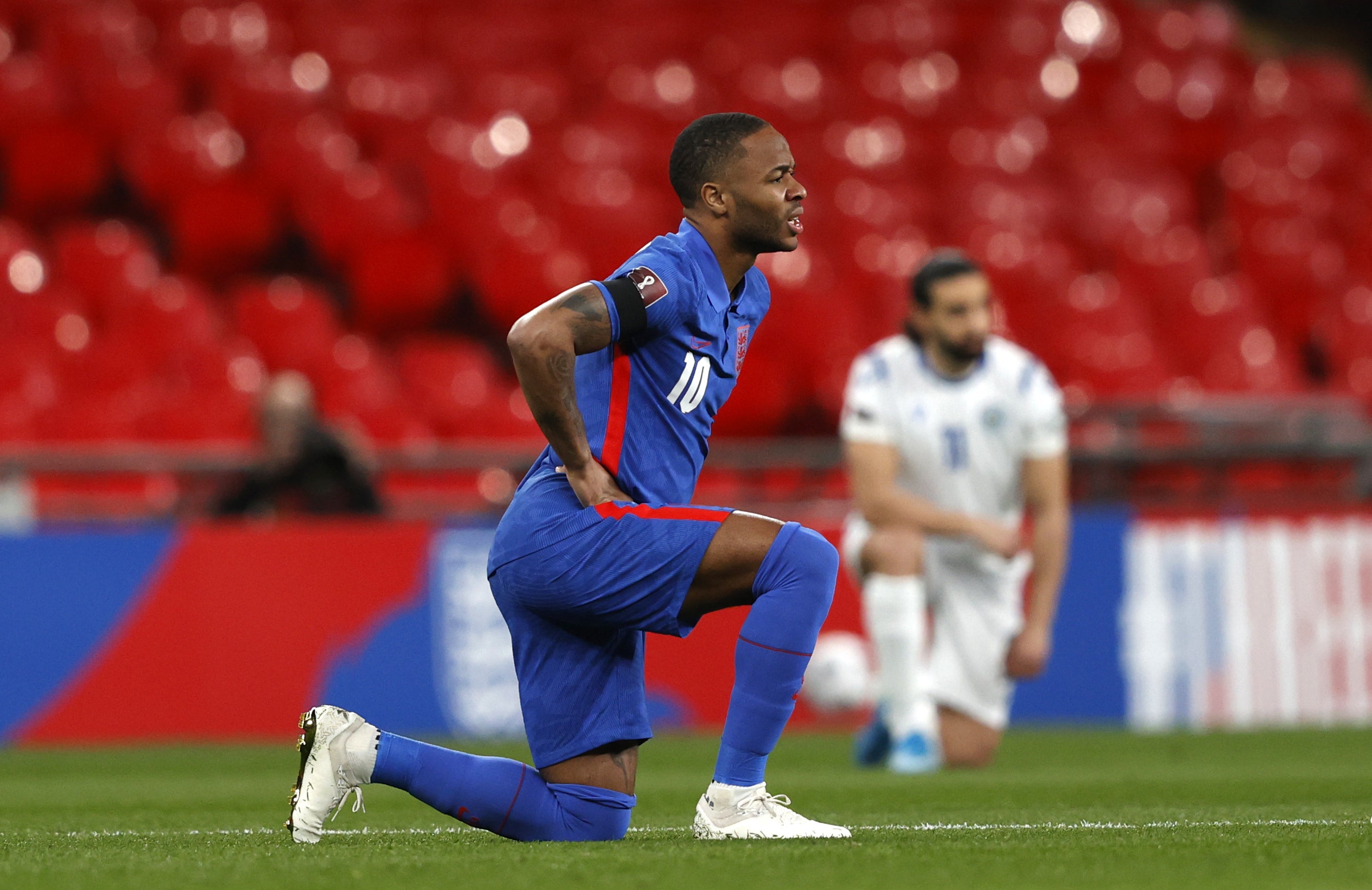What is the government’s problem with taking the knee?
Like football management, political leadership requires the ability to think ahead, use some imagination and give a clear message. So far, Gareth Southgate’s team is ahead of Boris Johnson’s by a couple of goals, and the game has barely begun, writes Sean O’Grady


“Keep politics out of sport” is a slogan we’re hearing a lot of again, thanks to the controversies over historical tweets by members of the England cricket team, and some booing of the “taking the knee” protests by the English and Welsh teams, though not the Scots, in the run-up to the Euro 2020 football championship. The truth, though, is that sport and politics have always been tangled up, particularly at the international level.
We can think, for example, of the 1936 Berlin Olympics and Jessie Owens, the boycott of apartheid-era South Africa and the athlete Zola Budd, of the Moscow Olympics of 1980 and the Los Angeles games four years later, when the US and Soviet blocs applied sanctions to one another, and right up to the design of the Ukraine football shirt for the Euros, depicting the Crimea as part of Ukrainian sovereign territory. Images such as the England football team making the Nazi salute at a “friendly” match in 1938, or Tommie Smith and John Carlos giving the Black Power salute on the podium at the Mexico Olympics in 1968 remain stark and powerful decades on. Politics doesn’t stay out of sport for long. It can’t.
Politically, footballers “taking the knee” presents an acute difficulty for the government, and a familiar one – what should the line be, and how will ministers be made to stick to it? The gesture poses particular problems for the Westminster government vis a vis the England team. Thus far, the government has played a poor game, its defence in disarray and its attack at best muted.
There are three current versions of the policy. Boris Johnson has given the lead by indicating that the players have the right to make the protest, and make their feelings known, but has not actually said he supports it. Gillian Keegan, an education minister, says it is “divisive”, deriding it as “symbolism more than action” and adding, in an oddly oblique formulation: “There are some Conservative MPs [who] are very much against it, why? Because Black Lives Matter stands for things that they don’t stand for. It’s really about defunding the police and the overthrow of capitalism, which is, you know, Black Lives Matter the actual political organisation.”
Then along comes the vaccines minister and football fan Nadhim Zahawi who does back “the knee”, though being careful to stress it ought not be “extrapolated” into support for BLM, which, in any case is a very broad and varied movement, not all of it “Marxist” and seeking to dismantle capitalism. At least, thus far, the foreign secretary Dominic Raab hasn’t repeated his belief that it “has something to do with Game of Thrones”.
Often misinterpreted, wilfully or not, as a submissive gesture, the taking of the knee dates back to the civil rights movement in the 1960s, and its recent force derives from the way American sportsmen and women started to kneel rather than stand during the US national anthem, because they believe that their country is still one where racism is still too prevalent. The murder of George Floyd last year added hugely to the momentum of demands for racial justice and for black lives to be treated with the equal respect they have been denied for so long.
Normally, “the knee” would be an ideal issue for the Conservatives to weaponise in the culture wars, and some have done so, instinctively. However, as the prime minister’s more equivocal stance suggests, this one is more complicated. As Marcus Rashford demonstrated in his campaign for school meals, footballers tend to be popular, charismatic figures capable of galvanising public opinion. If Gareth Southgate and the entire squad are eloquent and noble in taking their consciences seriously in a sincere gesture such as this, do the prime minister and his colleagues really want to be against them? Moreover, does the Tory party want to find itself allied with those doing the booing? Not all of the truculent England fans spoiling that dignified moment are students of Voltaire, and some will be unapologetic in their racism – in the stadia and on social media. Surely Johnson doesn’t want them as a vocal fan base?
And what if – pushing credulity – England actually win the tournament, or even makes it to the final in some plucky display of heroism, those strikers, midfielders and defenders of colour making their own skilled and brave contribution to the team effort and national glory? Should football, at long last, come home, would Johnson like Gareth and the boys to turn around and tell him to keep politics out of football, refuse to be exploited for his own nefarious purposes and boycott the Downing Street reception, sticking instead to the lavish party the Queen will undoubtedly throw for them?
Like football management, political leadership requires the ability to think ahead, use some imagination and give a clear message. So far, Southgate’s team is ahead of Johnson’s by a couple of goals, and the game has barely begun.


Join our commenting forum
Join thought-provoking conversations, follow other Independent readers and see their replies
20Comments